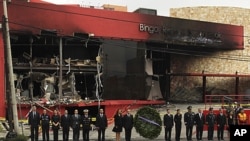Mexico has been shaken by another act of violence, this time , where gunmen set fire to a casino, killing more than 50 people. Mexican authorities vow to bring the perpetrators to justice, but, in spite of military deployments, the government so far has been unable to stop drug-related violence that has claimed more than 41,000 lives in the past five years.
Speaking to the Mexican people in a broadcast address Friday morning, Mexican President Felipe Calderon had harsh words for the criminal gangs that have terrorized his country with acts like the fire attack in Monterrey Thursday.
“It is clear to everyone that the enemies of Mexico are the criminals. Yesterday they showed to what point they are capable of going in their stupid and irrational violence," he said.
He also called on the Mexican Congress to approve judicial reforms that would help the nation fight criminals, and renewed efforts to fight corruption in police forces that often help criminals act without fear of capture or punishment. Only a small percentage of major crimes in Mexico are resolved through the capture, let alone conviction, of the persons responsible.
In a news conference Friday, Rodrigo Medina, the governor of the state of Nuevo Leon, where Monterrey is located, showed video from security cameras of the gunmen arriving at the casino Thursday.
He said at least four vehicles pulled up in front of the casino. Several gunmen can be seen getting out and entering the building, some carrying containers that the governor speculated contained the fuel used to start the fire. Shortly after, frightened patrons are seen rushing out before black smoke obscures the view.
The horrific crime, which has been condemned by some as terrorism, was likely intended as a strike against a casino owned and operated by one of the major drug cartels. The Gulf Cartel and the group known as Las Zetas have been fighting for control of criminal enterprises in northern Mexico for the past few years.
Scott Stewart, Vice President of Tactical Intelligence for the Austin, Texas-based Stratfor global intelligence company, follows the Mexican drug wars closely.
“We are trying to run down some rumors that we have received that basically there were some attacks on Wednesday evening against Gulf Cartel-controlled casinos in Reynosa and that this was either a continuation of that or it was retaliation by the Gulf against a Zeta-controlled casino,” he said.
Stewart says that details that have surfaced suggest the gunmen wanted to burn down the building, but did not consider that the people inside would panic.
“We had gunmen who went in, ordered the patrons out and then torched the place. Basically, my take on it is that someone was trying to torch the cash cow of an opposing cartel, was not looking for mass casualties, but mass casualties resulted when people did not evacuate and they were caught by the fire,” he said.
Although President Calderon has sent military units to various parts of Mexico, including Nuevo Leon, Stewart says they have been ineffective in carrying out what are essentially police operations and that the lack of honest, effective local police has allowed the criminal gangs to dominate the scene.
“Usually they are bringing in military units from outside the city, so they also lack the community policing element that is so necessary to understand the area, who belongs, who is out of place, the sort of street intelligence that really helps cops,” he said.
In spite of the widespread violence in some Mexican states, much of the country remains peaceful and in recent public opinion polls a majority of Mexicans rejected the idea that their country has become more dangerous than Iraq. Even in areas touched by violence, citizens seem unwilling to contemplate the need for help from outside the country, especially from the United States, whose help, Stewart says, curbed the power of drug trafficking gangs in Colombia.
“You have the aspects of nationalism and pride reflected in that poll and, of course, that is the same sort of nationalism and pride that is kind of resulting in the United States not being able to provide all the assistance it could to the Mexicans," he said. "It still has not gotten to the point where the Mexicans will allow the U.S. to provide the same depth of help they were able to provide to the Colombians.”
President Calderon began an all-out offensive against organized criminal bands in Mexico shortly after taking office in December 2006, but since then violence has surged in some parts of the country, especially in northern states on the U.S. border. Although drug smuggling is the major activity of the gangs, they are also involved in kidnapping, extortion, oil and gasoline theft, carjackings, bank robberies and other crimes.
Mexico Shaken by Deadly Casino Attack
